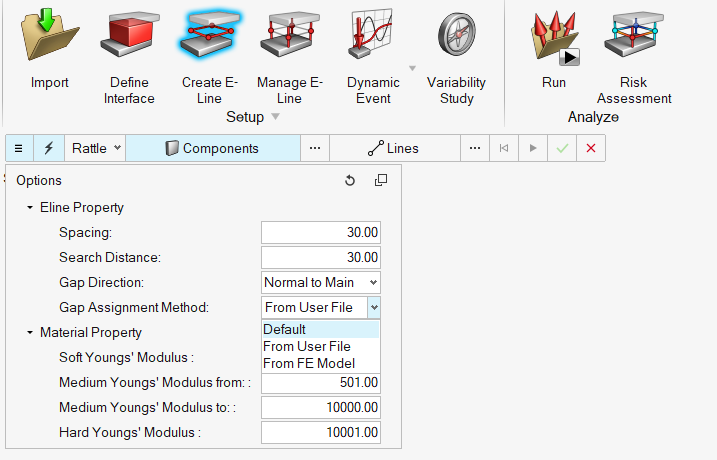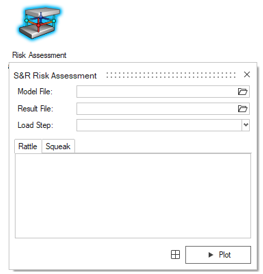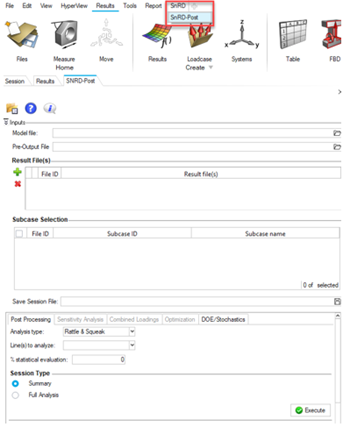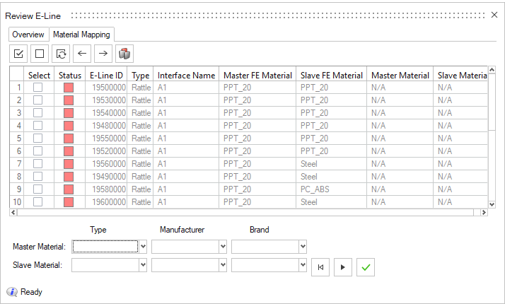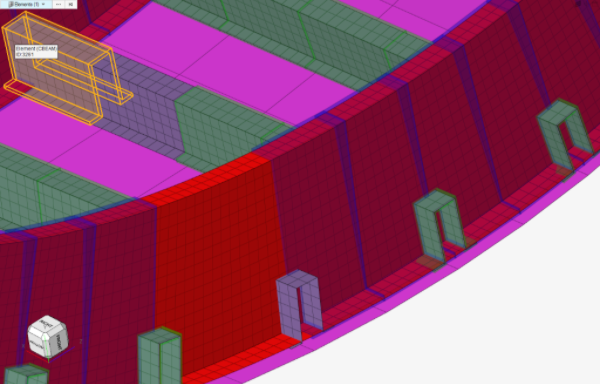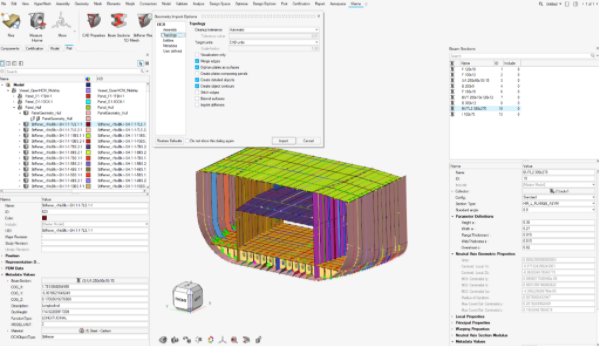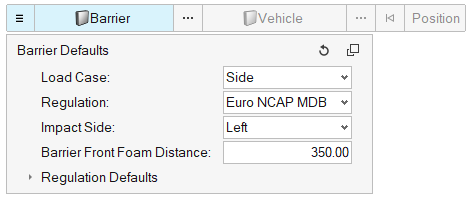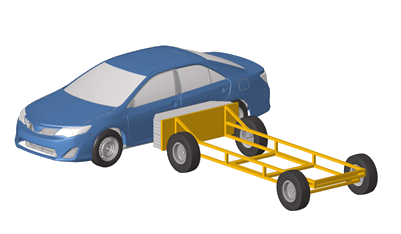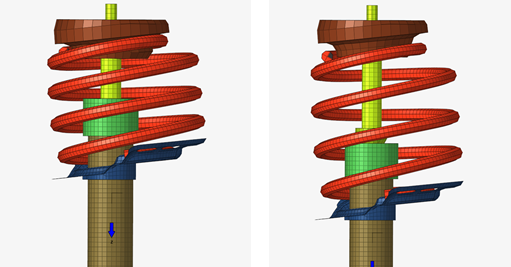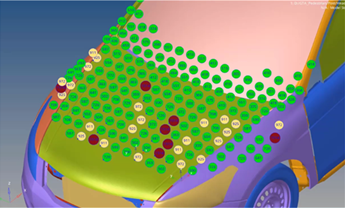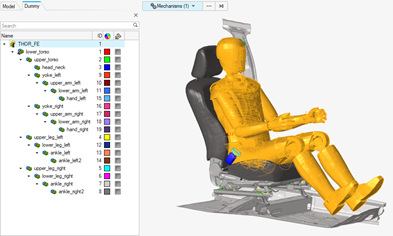What's New
View new features for Engineering Solutions 2021.2.
Aerospace 2021.2 Release Notes
Highlights
- Starting with the 2021.2 release, the tools available in the Aerospace pull-down menu are migrated to general pages and/or removed if the use case is already covered in other tools. This is valid in HyperWorks only.
- In the 2021.2 release, all menus available under the Beams/Checks/Results cascade were removed from the pull-down.
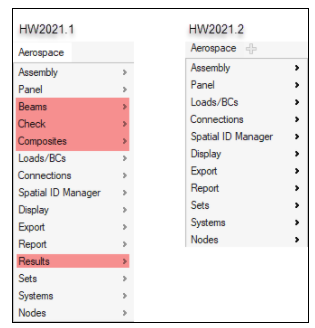
Figure 1.
- Beams
-
- Section Cut (Create and Review) were removed (available in the search bar for 2021.2) as covered by Section Property context.
- Split 1D Elems is removed (available in the search bar for 2021.2).
- Beamsection from CSV and Beam Update are migrated as a menu under the 1D Mesh group.
- Beam review is deprecated as already superseded by 1D Mesh review tool.
- Replace Orientation Nodes By Cord is covered in this release in
the 1D Mesh Orient tool.
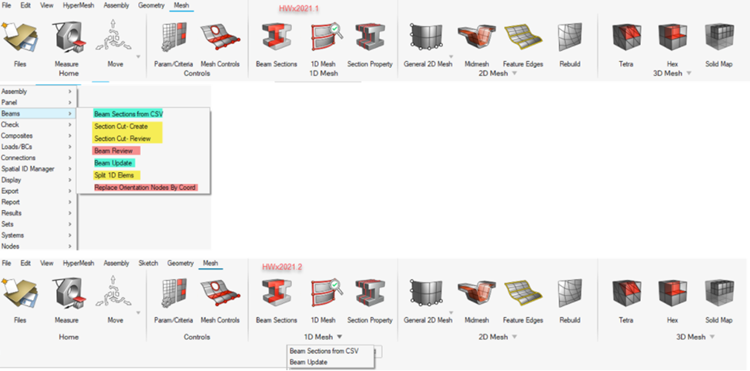
Figure 2.
- Checks
-
- List 1D elements Elems from Orientation Nodes is deprecated as
covered by Idle mode:
- Select the node and then switch to elements finds 1D elements using nodes as orientation node.
- Nastran Checks are available as Validate in the Model
Checker.
- Global Model Validation and Model reduction are special checks that can be loaded in the Model Checker directly.
- CFAST Validation is available in the search bar only.
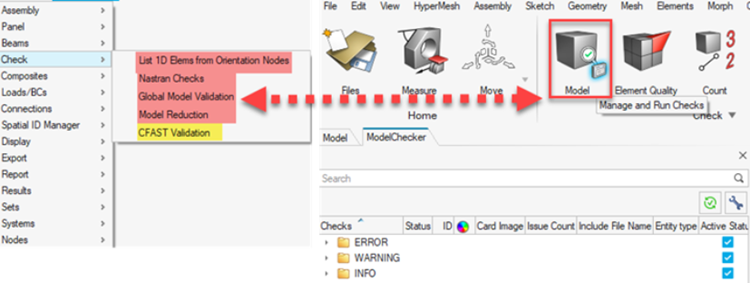
Figure 3.
- List 1D elements Elems from Orientation Nodes is deprecated as
covered by Idle mode:
- Results
-
- File loader and derived loadcase are migrated to the regular Results Browser in the Post ribbon.
- Free body tools have been migrated to the Post ribbon.
- Results Query and MinMax/Ranking/Envelope have a new entry point in the Post ribbon (Tools).
- The Matrix Browser has a new entry point in the Post ribbon.
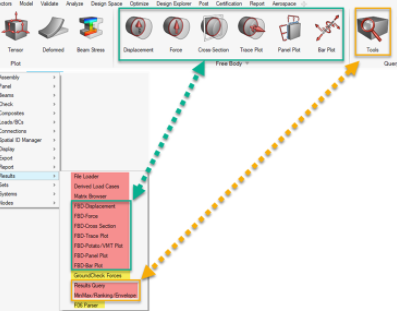
Figure 4.
- Spatial ID Manager
- The older Spatial Renumbering tool is deprecated. The feature can now be
accessed from the Assembly ribbon.
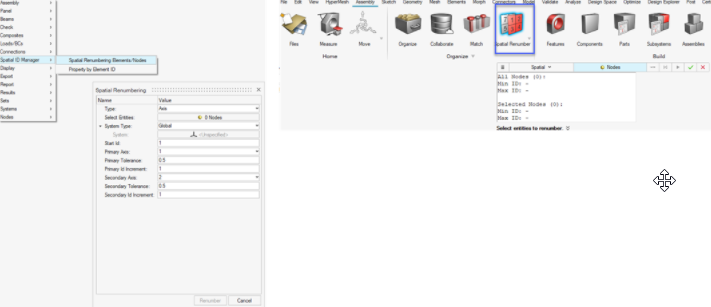
Figure 5.
Altair Squeak and Rattle Director 2021.2 Release Notes
The Squeak and Rattle Director (SnRD) has been included in HyperWorks since v.2021. Hence the SnRD pre and post-processing modules are available without any separate installation.
Highlights
- Easily compare SnR Risk for all E-lines from multiple design iterations and/or load cases.
- Enhanced Dynamic Event creation with the added control of name and scale factor.
- Pause and Resume E-line creation.
Enhancements
- Loadcase Enhancements
- Scale loads differently for each direction through a scale factor. This
can be done both at the creation of the dynamic event as well as through
the Review Loadcase table.
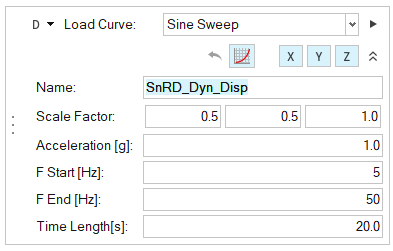 Figure 6.
Figure 6.  Figure 7.
Figure 7. - Create Dynamic Load from existing Curve data
- If curve data already exists in the right format (TABLED1)
in a model, you can now use these in dynamic event load case
creation directly. You will be prompted to select a load
curve for each direction.
 Figure 8.
Figure 8.
- Static Loadcase Enhancements
- For a Quality Feel Investigation (Static Event), multiple
points are required to be evaluated separately. To ease this
setup, there is an option to create one static load case for
each selected node in static event creation.
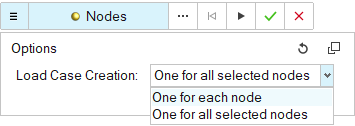 Figure 9.
Figure 9.
- E-line Enhancements
-
- Name and Renaming of E-lines
- For better organization and review of E-lines in
post-processing, you can name E-lines directly in the Review
E-lines Table. You have an option to select from an existing
list of names that are imported from the DTS file or enter a
new name manually.
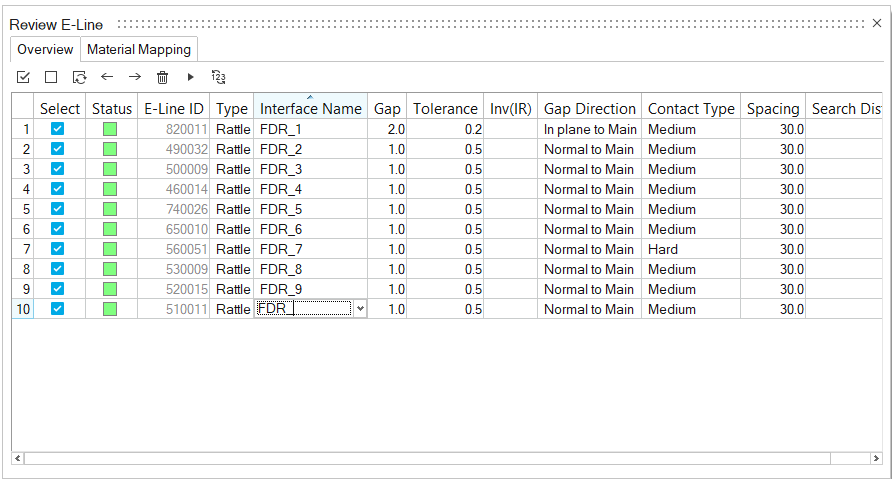 Figure 10.
Figure 10.
- Pause E-line Creation
- You can now pause the creation and realization of E-lines.
 Figure 11.
Figure 11.
- Lock of E-line IDs
- To avoid issues caused by manual renumbering in HyperWorks, the IDs of the nodes belonging to E-lines will be locked. Thus, it will not be renumbered through HyperWorks renumbering functionality unless unlocked in ID-Manager. Now the renumbering of E-lines can still be performed through Manage E-line Table.
- Risk Assessment Enhancements
-
- SnR Risk Comparison
- Comparison between design iterations and/or loadcases is
made easier as the Max Rel Displacement for all Active
Results is visualized in the BarPlot.
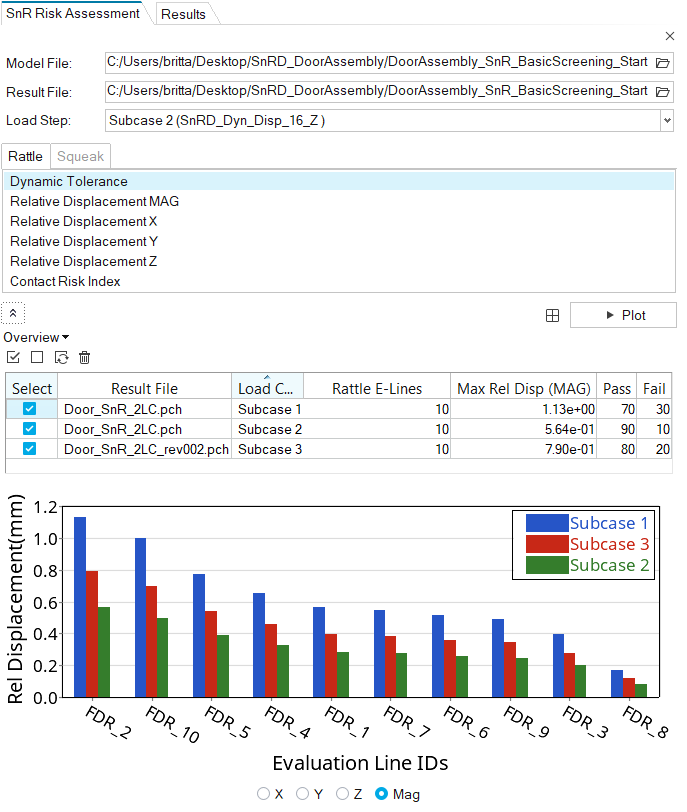 Figure 12.
Figure 12.
- Show Names in Overview Bar Plot
- Show names of E-lines instead of IDs in the Bar Plot in Risk
Assessment Overview.
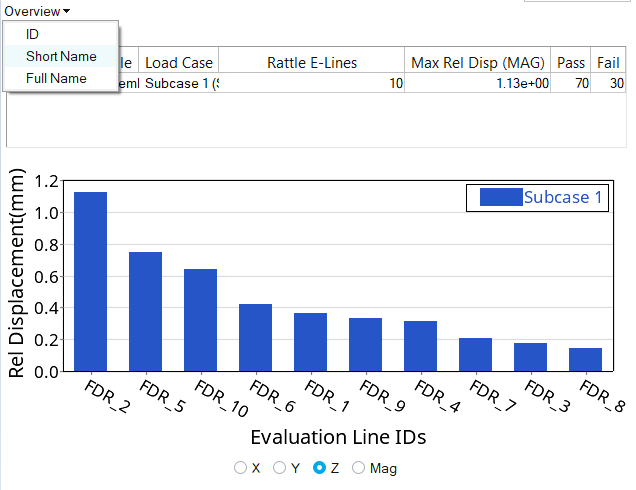 Figure 13.
Figure 13.
- General Enhancements
-
- Model Files Removed from Installation Package
- To reduce the footprint size, the following tutorial model
and demo model files are no longer included in the local
installation. You can now find zipped tutorial model files
and demo model files on Altair One via the Altair Community,
Altair Marketplace, and Altair Connect sites. Altair
recommends that you create an Altair One account and use it
as your primary portal to access product documentation, a
Knowledge Base, and customer support.
- Tutorial Model Files
-
- HyperWorks
- Squeak and Rattle Director
Known Issues
- SnRD Pre
-
- Long Realization time of E-lines in large models.
- SnRD Post
- The following post-processing functionalities are not supported in this
version:
- Comparing Squeak Results from multiple load cases.
- Comparing multiple load cases from different files with the same load case ID.
- Combined Loading with a model which only consists of Squeak lines.
- Loading a model file from a network location (unless it’s mapped to a drive).
Resolved Issues
- SineSweep curve was generated wrong for a certain set of values,this is resolved.
- A full installation of Compose is no longer a requirement to run SnRD.
Marine 2021.2 Release Notes
No updates were made to Marine in 2021.2.
NVH Director 2021.2 Release Notes
Highlights
- Job Submission migration to PBS Access
- Tire Management and workflow enhancements
New Features
- Acoustic Cavity Coupling
- New options to support structure-fluid coupling for Akusmod and DMIG. New option to specify modal damping for cavity and enhancements in handling creation of coupled reduced model for combined structure and cavity.
- Mount Optimization
- New feature to visualize animation of rigid body modes, add customized static loadcases and transient torque.
- Hydrostatic Mounts
- New feature for automatic prediction and tuning of hydrostatic mounts parameters to match the test characteristics.
Enhancements
- Job Submission
- Enhancement to create a configuration file on job submission with details on loadcases, module states, connection states and configuration giving the summary for an analysis.
- Response Manager
- Enhancement to specify and request responses in user-defined local coordinate system.
- Modal Models
- Enhancement to save the modified modal models with modal parameter changes and assign it as a representation file.
- Module Prep Folder
- Enhancement to specify ‘Prep’ folder in your workspace for saving the representation files.
- Modes Visualization
- Enhancement to visualize modes of CMS-SE.
- Correlation
-
- Enhancement to save and reuse the configuration file for modal correlation set-up.
- Enhancement in PreTest to export nodes in cylindrical coordinate system.
Resolved Issues
- Issue related to saving reposition definition in assembly template .csv file.
- Issue related to handling units in spindle loads utility.
Safety Tools
New Features
- Seat Foam Deformer
- This new feature allows you to perform the seat foam deformation process directly in HyperMesh. Compared to the existing seat deformer using the pre-simulation approach, the seat foam deformer enables you to quickly get high quality results of the new seat foam shape, removing intersections with the dummy.
- Dummy pre-simulation
- A new feature in the dummy pre-simulation tool now allows you to directly select the initial dummy file, which is then automatically used for the simulation process. HyperWorks only exports an include file containing the load case information and a master file referring to the dummy and load case includes. This leads to an improvement of the performances of the tool, reducing the time for the export of the simulation deck.
- Combined seat and dummy pre-simulation
- This new feature, accessible from the Dummy pre-simulation GUI, enables you to set a pre-simulation run to perform the seat deformation and the dummy deformation in a single stage. This improves the occupant safety model set-up process by reducing the simulation time requested for the seat and dummy pre-simulation.
Enhancements
- Mechanism tool
- The joints attributes are now fully editable after the joint creation process, allowing an easy update of the joints. Delete and re-create the joint is no longer requested.
- Seatbelt system performances
- The performances of the seatbelt system tool are drastically improved, especially when modifications operations on the belt are applied. For example: interactive modification, belt update on dummy & seat motion, mesh size, or mesh type change...
- Pedestrian tool
- The marking of impact locations on outer surfaces is improved by considering openings, for example on the hood.
Resolved Issues
- Reading of the Radioss native H3D file to update airbag, dummy, or seat with simulation results, is now working.
Aerospace 2021.1 Release Notes
Enhancements
Results Query now supports:
- Results on user-defined Coordinate Systems
- Both Cauchy and Engineering Strain Tensor
- User-defined Poisson Ratio, to Calculate Von Mises Strain
- Complex Results Output Formats: Magnitude, Phase, Polar (Magnitude + Phase), Real, Imaginary, Cartesian (Real + Imaginary), mag*cos(wt+phase) and mag*cos(wt-phase)
- New Data Components: Von Mises, Signed Von Mises, Tresca, Triaxiality, P1, P2, P3, Max Shear, Intensity, Pressure and Absolute Max Principal
- New Layers: Maximum, Minimum, Extreme, Count, Average, Sum, maxLayer and minLayer
Altair Squeak and Rattle Director 2021.1 Release Notes
The Squeak and Rattle Director (SnRD) has been included in HyperWorks since v.2021. Hence the SnRD pre and post-processing modules are available without any separate installation.
Highlights
- Easy design iteration comparison with an added overview summary in Risk Assessment.
- Enhanced Control of Gap and Tolerance data on E-lines.
New Features
- Gap Assignment Method
- Define which method to use to assign Gap and Tolerance values to E-lines. The assigned gap and tolerance values can be reviewed in E-line Review Table.
- Risk Assessment Summary
- A summary of risk for all E-lines in the model, for all loaded design
iterations and load cases, is now provided for easy comparison and
report creation.
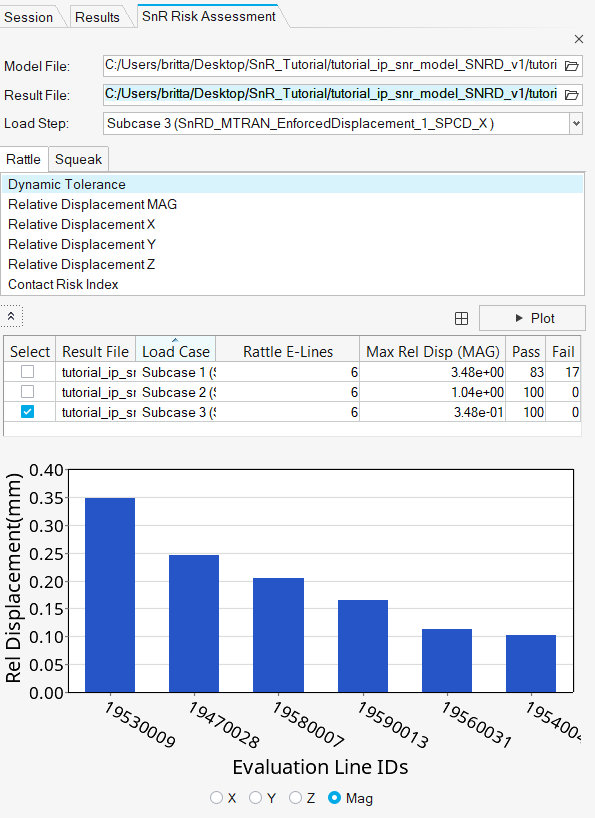
Figure 15.
Enhancements
- Review E-line Table
- The Review E-line table has been enhanced and now shows mapped Gap,
Tolerance, and Impulse Rate values for each E-line. The Gap and
tolerance values are assigned based on the choice of Gap Assignment
Method and the Impulse Rate (INV(IR)) is assigned based on the material
mapping. Both can be manually entered and edited in the table. This
enhancement allows you to control and review the output in the
Pre_output.csv file fully before export.
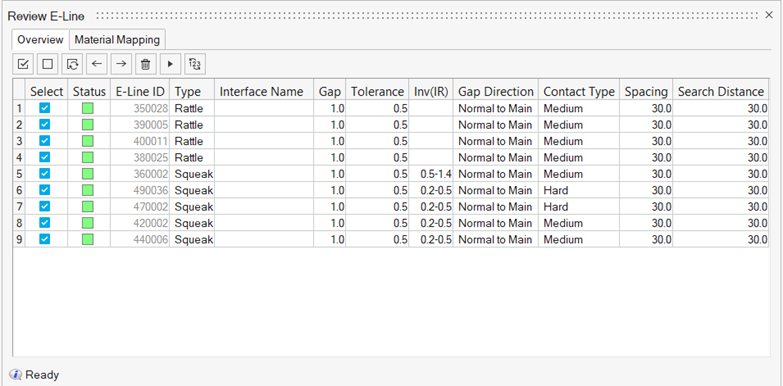
Figure 16. - Realize at Creation of E-lines
- In the Create E-line function, you also have the option to realize the
E-lines directly. This is very useful for automatic E-line creation and
for one at a time creation where you want to review E-line directly.
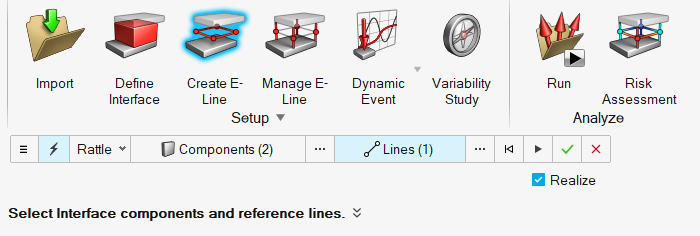
Figure 17. - Variability Study
- A Details tab has been added in the Review of Variation Studies Table
which provides you with a good overview of all design variables and
allows for editing of variables values.
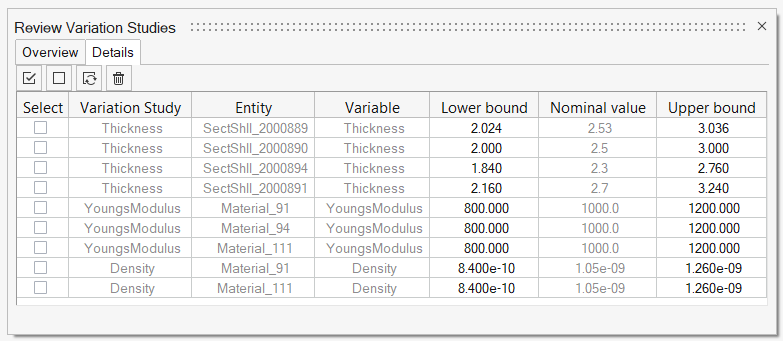
Figure 18. - Model Import
- Import of model, GD&T data, and Material data from Stick&Slip
test separately is now straightforward. Enable and select only the files
you want to import. As an example, this improvement allows for the
import of new and updated GD&T or material data to an already loaded
model.
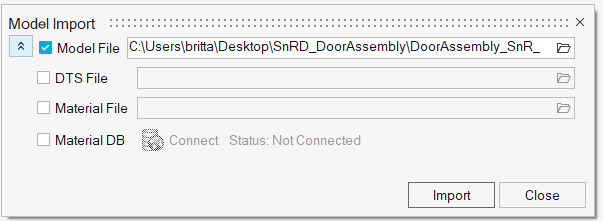
Figure 19.
Known Issues
- SnRD Pre
- Long Realization time of E-lines in large models.
- SnRD Post
- Comparison of Squeak Results from multiple load cases is not supported.
Resolved Issues
- All Issues reported in the previous versions are fixed in this version (besides the stated known issues).
- A Stochastics Variability Study now generates a HyperStudy session with a Normal Variance Distribution.
Marine 2021.1 Release Notes
No updates were made to Marine in 2021.1.
NVH Director 2021.1 Release Notes
Highlights
- Metamodel Save and Open options in File drop-down and Files icon
- Sub profiles for accessing different NVH profiles, such as Full Vehicle NVH and Standard NVH
New Features
- CDTire Resizing
- The new Resizing feature enables generation of CDTire with modified tire dimensions without the need to change the CDtire parameter file.
- Scatter Plot for Engine Mounts DOE
- The new scatter plots enable better study and visualization of Engine Mounts DOE study.
Enhancements
- Order based subcases for order cut analysis
- Enhancement in the order cut analysis utility supporting order based subcases in addition to existing RPM based subcases.
- Parameters for ERP in process manager
- Enhancement in the process manager to support ERP specific parameters in the parameters section.
Resolved Issues
- Issue related to visualization of inclined mounts in engine mounts utility
- Issue related to validation in FRF-to-CDS in case of test universal files with no labels
Safety Tools
New Features
- Seatbelt Tensioning
- This new feature allows the simulation of a tensioning process on a seatbelt segment directly in HyperMesh to improve the quality of the belt path and remove slack between dummy and belt. This feature is available in HyperWorks only.
- Airbag Solutions
- A new Airbag Solutions ribbon is introduced in HyperWorks. It contains a suite of workflows to perform a complete airbag folding process: airbag patches stitching, airbag folds and airbag fit into housing. Each step of the airbag folding process uses Radioss, providing high folding results accuracy.
Enhancements
- THOR Dummy and IRTRACC manipulation
- For THOR dummy, which contains IRTRACC kinematic systems, the dummy and mechanism tools are automatically coupled to allow the motion of the dummy by considering the mechanisms defined on the IRTRACCs. Furthermore, the positions of the IRTRACC mechanisms are also considered during the export of the dummy pre-simulation decks to simulate the IRTRACC positioning.
- Pedestrian Tool
- The following enhancements are made in the Pedestrian tool:
- Windshield Periphery Detection function for EuroNCAP will automatically detect default green zone on windshield.
- Ability to export only target csv file for selected impact point.
- GTR marking will automatically create Corner of Gauge Block.
- EuroNCAP/CNCAP/ EuroNCAP 2022-2023/CNCAP 2021 pedestrian marking will create lower leg limit by bumper beam and plane touch point.
- Null beams creation for all marking lines through marking options
- Separate step size at marking option for Side Reference Lines
- Enhanced marking logic for Bonnet Rear Reference Line for active hood condition.
Resolved Issues
- Added correction while creating Radioss XREF in the pre-simulation tools to generate it only on components defined in the H3D file.
- Resolved issue while creating Ball Joint (By Positions) in Mechanism.
- 5th attribute value “-3” on the first line of the MECHANISM data written by Primer V17 is now supported.
Aerospace 2021 Release Notes
New Features
- Aeroelasticity
- Dedicated ribbon for Aeroelasticity modelling tools is added for NastranMSC and OptiStruct user profiles in HyperWorks. It includes:
Altair Squeak and Rattle Director 2021 Release Notes
Overview
In this release, Squeak and Rattle Director (SnRD) is available within the HyperWorks suite. The SnRD Pre and Post-processing modules are available without the need for PSO installation.
- Enhanced user experience
- Intuitive and highly automated engineering workflows
- Built-in industry best practices and engineering data
- Single platform for the designer, part-time analyst, and NVH-S&R CAE expert
The Squeak and Rattle analysis and investigation are available at every stage of the product development cycle, even when little or no data is available. This helps the analysts to drive the design changes by utilizing simulation, parallel to the design process.
New Features
- New SnRD Ribbon
- There is a new SnRD ribbon.

Figure 20. - 2D Squeak Plot
- Plot the relative displacement in the contact plane for better squeak
evaluation. This plot is useful to fully understand the movement in the
contact plane and the principal directions.
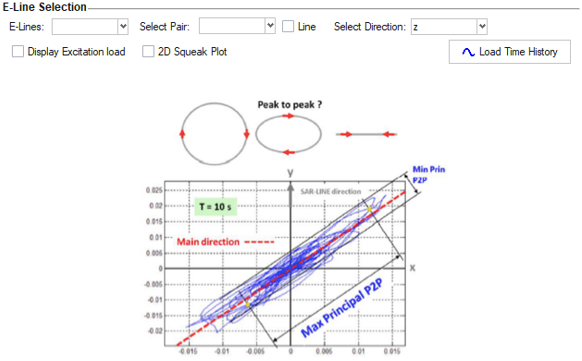
Figure 23. - Single Point E-Line using Element to Element Creation
- Create a single point E-line by selecting two elements. For example, create diagonal E-lines to track opening distortion, flexible attachments such as clips/snaps or other one point E-lines.
Enhancements
- Save Session
- Save and restore all progress made in SnRD in an .HM database.
- Define Interfaces
- Creation of geometrical lines can be controlled with advanced options,
such as combining and splitting.
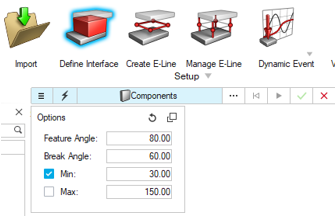
Figure 24. - Manage E-Lines
- Renumber E-lines through the E-line review table, one at a time or in
bulk by entering a range.
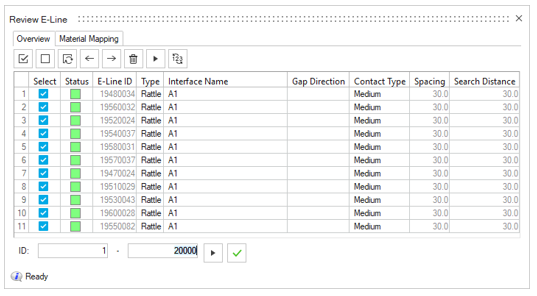
Figure 25. - Dynamic Event
- Control solver settings with advanced options in Dynamic Event
creation.
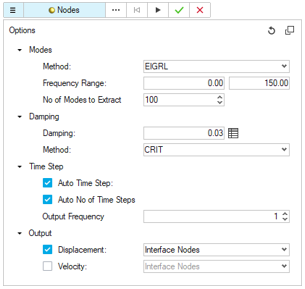
Known Issues
- Post-processing
-
- Due to a necessary check for improved stability, loading a result file in SnRD Post and Risk assessment takes longer in this version.
- Loading and comparing results from two load cases from two different result files with the same load case ID is not supported.
Resolved Issues
- E-line creation and realization performance, negatively impacted in the previous release, are now fixed.
- Numbering convention of E-lines is further improved and solved issues related to renumbering of E-lines.
Marine 2021 Release Notes
New Features
- Beam to Shell
- New feature to generate either surfaces or shell mesh equivalent to beam midmesh.
- Open Class 3D Exchange (OCX)
- This new version introduce support for OCX v2.8.5 xml schema as CAD import formats. OCX is intended to become an open industry standard for the exchange of design information between designer/yards and classification societies.
Enhancements
- Exodus interface
- Marine tools such as Stiffener Meshing and CAD Properties have been extended to support Exodus solver profile.
Resolved Issues
- Foran CAD reader used to create old Assemblies instead of Parts/PartAssemblies. This issue has been fixed.
NVH Director 2021 Release Notes
New Features
- HyperWorks NVH
- A separate shortcut to invoke Hyperworks NVH. NVHD assembly building
features and functionalities are arranged in Assemble, Analyze, and
Tools ribbons. NVHD post-processing functionalities are arranged in Post
ribbon.

Figure 28. Assembly Ribbon
Figure 29. Analyze Ribbon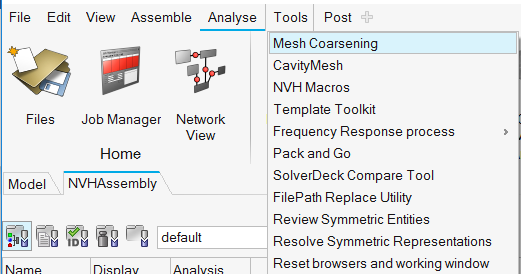
Figure 30. Tools Ribbon
Figure 31. Post Ribbon - Analysis Manager with Multiple Configuration Support
- Analysis manager is redesigned to support multiple model configurations. Capability to create model configurations, analysis loadcase, and analysis setup in a modular way. An analysis can be created or batch runs can be submitted for possible valid combinations of model configuration, analysis loadcase, and analysis setup. Users can also review multiple analysis for quick comparison between different analysis.
- CAE Data Management and Versioning
- New feature for CAE Data Management and file-based versioning of Assembly XMLs and Representation files has been added, with the capability to version at multiple levels: team Vs analyst, major Vs minor. Access control with possibility to assign roles to users for editing and/or viewing. Effective management of tracking up-to-date files and file conflicts with clear traceability of individual and team changes allowing possibility of exchange data between different projects and/or previous versions.
- CDTire Support for Cavity
- Enhancement in the CDTire to support tire cavity and rolling effects and evaluate its performance on vehicle NVH responses.
- Modal Participation for ERP
- Enhancement in the Modal/Panel participation utility to support post-processing and diagnostics of modal participations for ERP.
Enhancements
- Network View
-
- Interaction between network view, assembly browser and graphics area
- Visualize Post-card image of module on hover over modules in network view
- Option to select configurations
- Option to realize/unrealize connections
- Option to get information on mass of modules and connections
- Option to prepare module
- Option of subsystem analysis
- Color palette for advanced connections
- Assembly XML Import Performance
- Significant performance improvement in the assembly XML import resulting from improvements in template import performance and saving HM file for that assembly instant.
- On-the-fly diagnostics computation for grid participation
- Enhancement in the integrated diagnostics to compute grid participation on-the-fly for road inputs and powertrain excitations. Display options and filters for diagnostics plots.
- Engine Mounts Optimization
- Enhancement in engine mount optimization to perform reliability-based optimization (RBDO) in addition to existing deterministic optimization.
Resolved Issues
- Issue related to identification of nodes in PreTest utility after animation of modes
- Issue related to DPR plot with legend showing between 0 to 1 only
- Issue related to saving of subxmls in Preserve mode where all subxmls were saving instead of only selected subxmls
- Issue related to rendering of configuration specific connections
Safety Tools
New Features
- Barrier Position Tool
- This new tool, available in the Safety ribbon in the LS-DYNA and Radioss
solver interfaces, enables an automatic positioning of the crash barrier
around the vehicle as per the selected safety regulation. The tool
provides following functionalities:
- Support of all safety regulations: C-NCAP, Euro-NCAP, FMVSS, IIHS, J-NCAP and UN-R
- Support of all load cases: Front, Side and Rear
- Following positioning methods are implemented: Overlapping method, Side with IRD method, Side with R-Point method, Pole
- User-defined gap between barrier and vehicle
- Automatic creation of transformations and positions entities
- Automatic switch of the barrier include file to *INCLUDE_TRANSFORM or /SUBMODEL respectively for LS-DYNA and Radioss solvers
- Dummy Positioner: Automatic contact detection
- This new functionality enables the automatic contact detection between dummy limbs and surrounding structural components. When the contact is detected, the motion of the limb is automatically stopped and thus, avoiding intersections.
- Mechanism Tool: Automatic morphing
- This new functionality enables the automatic morphing of components using the slider joint. All morphing entities are automatically created, and the morphing happens in real time when the joint is manipulated.
- Pedestrian Impact Solution
- The pre-processing the pedestrian impact regulations have been enhanced
with the following features:
- Hard parts distance contouring and offset zones creation
- Impact points refinements
Enhancements
- Graphical selection of mechanisms and dummies
- Dummies and mechanisms can be selected directly on the graphic using the Mechanism selector.
Resolved Issues
- Radioss XREF are now created on import of the h3d file in the pre-simulation tools.
- LS-DYNA seatbelt extraction was not working if the break angle between the 1D belt segments was too big. This limitation is removed and a break angle control in the seatbelt extraction tool is added.
